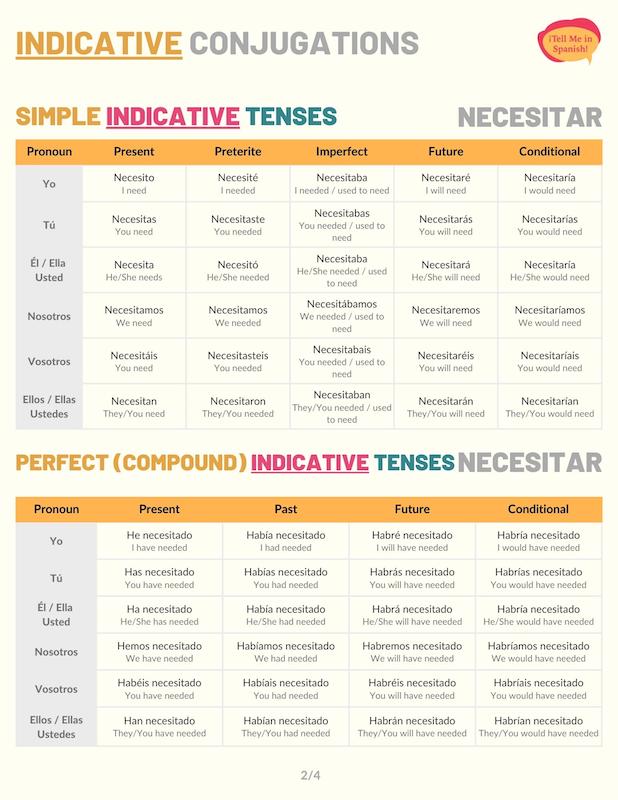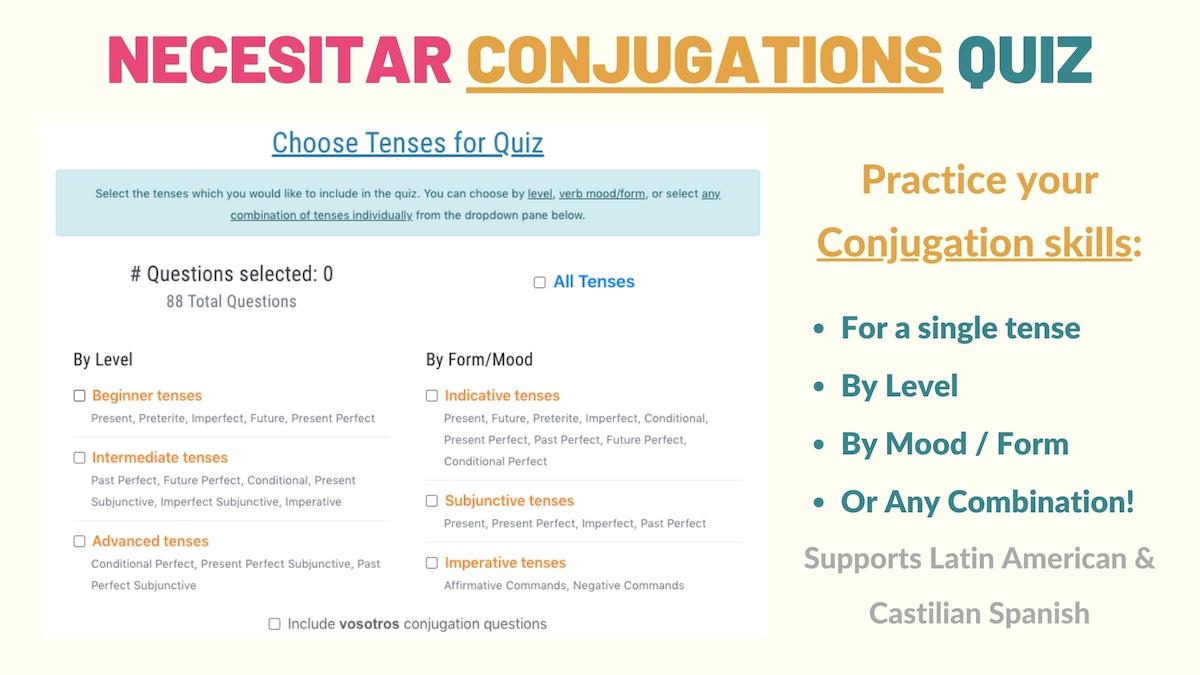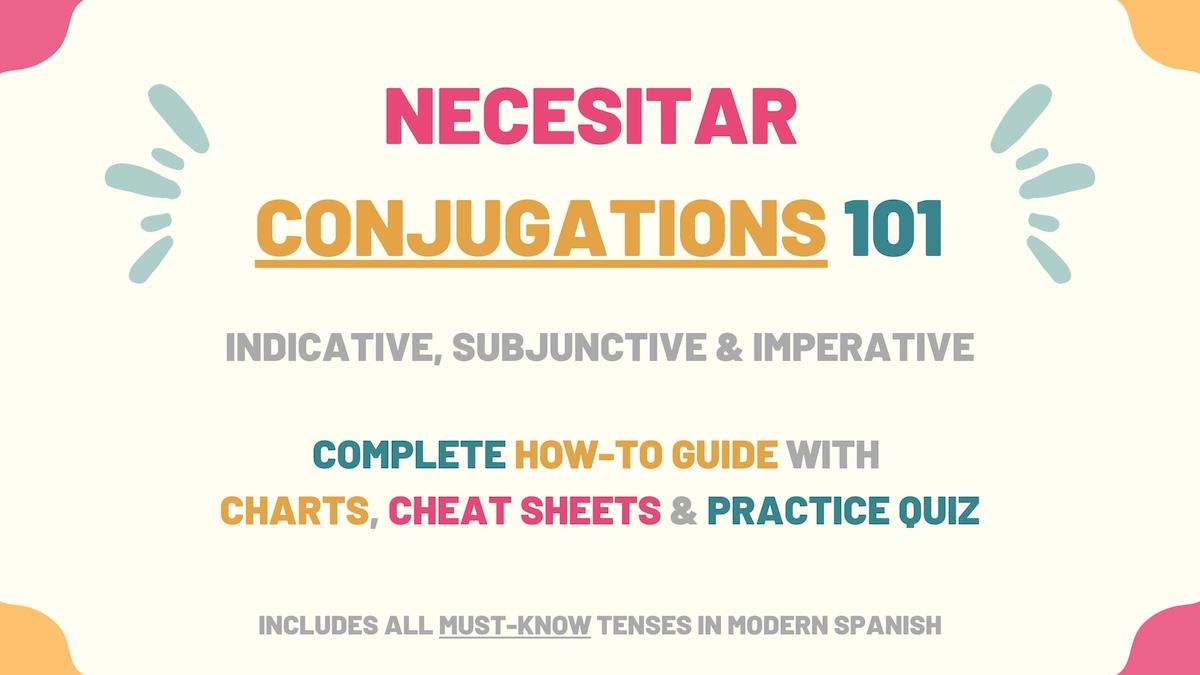Given that it’s a regular -AR verb, learning necesitar conjugation patterns can help you practice and get familiar with how to conjugate -AR verbs in Spanish. So, in this guide, we’ll go over the following topics:
- Necesitar Overview
- Indicative Tenses of Necesitar Conjugations
- Subjunctive Tenses of Necesitar Conjugations
- Imperative (Commands) of Necesitar Conjugations
- Uses & Examples
- Download Necesitar Conjugation Tables & Uses Cheat sheets
- Necesitar Conjugation Practice Quiz
Overview of Necesitar
| Verb Characteristic | Property |
|---|---|
| Verb Type | -AR |
| Irregular | No |
| Infinitive | Necesitar |
| Gerund (Present Participle) Form | Necesitando |
| Past Participle Form | Necesitado |
| Synonyms | Precisar, requerir. |
Indicative Conjugations of Necesitar
Present tense
Necesitar present tense conjugation is formed by adding regular -AR endings to the stem necesit. When conjugated to the present indicative form, this verb conveys that a person needs something at this point. For example: Necesitamos más leche.
| Person | Conjugation | Translation |
|---|---|---|
| Yo | Necesito | I need |
| Tú | Necesitas | You need |
| Él / Ella Usted | Necesita | He/She needs You (formal) need |
| Nosotros | Necesitamos | We need |
| Vosotros | Necesitáis | You need |
| Ellos / Ellas Ustedes | Necesitan | They need You (plural) need |
Preterite tense
Necesitar past preterite conjugations are used to mention what a person needed. Include time markers if you need to specify when that action occurred. Here is an example: Gracias, siempre no lo necesité.
| Person | Conjugation | Translation |
|---|---|---|
| Yo | Necesité | I needed |
| Tú | Necesitaste | You needed |
| Él / Ella Usted | Necesitó | He/She needed You (formal) needed |
| Nosotros | Necesitamos | We needed |
| Vosotros | Necesitasteis | You needed |
| Ellos / Ellas Ustedes | Necesitaron | They needed You (plural) needed |
Imperfect tense
The imperfect indicative conjugations of necesitar are also regular. In Spanish, we use these forms to explain that a person needed something for an extended period of time or to ask a client politely what they need. For example: Buenas tardes, ¿qué necesitaba?
| Person | Conjugation | Translation |
|---|---|---|
| Yo | Necesitaba | I needed I used to need |
| Tú | Necesitabas | You needed You used to need |
| Él / Ella Usted | Necesitaba | He/She needed He/She used to need You (formal) needed You (formal) used to need |
| Nosotros | Necesitábamos | We needed We used to need |
| Vosotros | Necesitabais | You needed You used to need |
| Ellos / Ellas Ustedes | Necesitaban | They needed They used to need You (plural) needed You (plural) used to need |
Near future
Present forms of ir + a + necesitar is how we conjugate to the immediate or near future in Spanish. With this tense, necesitar is used to explain that someone will need something soon in the future. Oigan, ¿van a necesitar el carro hoy?
| Person | Conjugation | Translation |
|---|---|---|
| Yo | Voy a necesitar | I’m going to need |
| Tú | Vas a necesitar | You’re going to need |
| Él / Ella Usted | Va a necesitar | He/She is going to need You (formal) are going to need |
| Nosotros | Vamos a necesitar | We’re going to need |
| Vosotros | Vais a necesitar | You’re going to need |
| Ellos / Ellas Ustedes | Van a necesitar | They’re going to need You (plural) are going to need |
Future simple tense
When conjugated to the future simple tense, necesitar conveys that a person will need something at some moment in the future. For instance: ¿Qué necesitarás para terminar este proyecto?
| Person | Conjugation | Translation |
|---|---|---|
| Yo | Necesitaré | I will need |
| Tú | Necesitarás | You will need |
| Él / Ella Usted | Necesitará | He/She will need You (formal) will need |
| Nosotros | Necesitaremos | We will need |
| Vosotros | Necesitaréis | You (formal) will need |
| Ellos / Ellas Ustedes | Necesitarán | They will need You (plural) will need |
Conditional tense
Necesitar conjugated to the conditional tense in Spanish conveys that someone would need something. If applicable to your sentence, you can add the conditions that need to be fulfilled for a person to need something. ¿Cuánto tiempo necesitarían?
| Person | Conjugation | Translation |
|---|---|---|
| Yo | Necesitaría | I would need |
| Tú | Necesitarías | You would need |
| Él / Ella Usted | Necesitaría | He/She would need You (formal) would need |
| Nosotros | Necesitaríamos | We would need |
| Vosotros | Necesitaríais | You would need |
| Ellos / Ellas Ustedes | Necesitarían | They would You (plural) would need |
Present perfect tense
The present perfect conjugations of necesitar are built by using haber (present tense) + necesitado (verb in Spanish past participle form). In this tense, this verb communicates that someone has or hasn’t needed something. For example: Por ahora, no he necesitado ayuda.
| Person | Conjugation | Translation |
|---|---|---|
| Yo | He necesitado | I have needed |
| Tú | Has necesitado | You have needed |
| Él / Ella Usted | Ha necesitado | He/She has needed You (formal) have needed |
| Nosotros | Hemos necesitado | We have needed |
| Vosotros | Habéis necesitado | You have needed |
| Ellos / Ellas Ustedes | Han necesitado | They have needed You (plural) have needed |
Past perfect
Haber (imperfect tense) + past participle of ‘necesitar’ is the structure you must use for forming the past perfect tense in Spanish. Use these conjugations to say that a person had or hadn’t needed something before another past reference point. Hasta este momento, los chicos no habían necesitado nada.
| Person | Conjugation | Translation |
|---|---|---|
| Yo | Había necesitado | I had needed |
| Tú | Habías necesitado | You had needed |
| Él / Ella Usted | Había necesitado | He/She had needed You (formal) had needed |
| Nosotros | Habíamos necesitado | We had needed |
| Vosotros | Habíais necesitado | You had needed |
| Ellos / Ellas Ustedes | Habían necesitado | They had needed You (plural) had needed |
Future perfect
Conjugate this verb to the future perfect tense when you want to say that someone will have needed something by or before some point in the future. No habrás necesitado nada.
| Person | Conjugation | Translation |
|---|---|---|
| Yo | Habré necesitado | I will have needed |
| Tú | Habrás necesitado | You will have needed |
| Él / Ella Usted | Habrá necesitado | He/She will have needed You (formal) will have needed |
| Nosotros | Habremos necesitado | We will have needed |
| Vosotros | Habréis necesitado | You will have needed |
| Ellos / Ellas Ustedes | Habrán necesitado | They will have needed You (plural) will have needed |
Conditional perfect
When conjugated to the conditional perfect tense, this verb communicates that someone would have needed to do something or if a past action condition had taken place. For instance: Habríamos necesitado más tiempo para completar ese proyecto.
| Person | Conjugation | Translation |
|---|---|---|
| Yo | Habría necesitado | I would have needed |
| Tú | Habrías necesitado | You would have needed |
| Él / Ella Usted | Habría necesitado | He/She would have needed You (formal) would have needed |
| Nosotros | Habríamos necesitado | We would have needed |
| Vosotros | Habríais necesitado | You would have needed |
| Ellos / Ellas Ustedes | Habrían necesitado | They would have needed You (plural) would have needed |
Progressive tenses
The progressive tenses of this verb emphasize that someone needs something at the moment of speaking. Use estar’s conjugations + present participle form of ‘necesitar’ to form these conjugations. For example: Por ahora, no estamos necesitando más empleados.
| Progressive Tense | Formula | Translation Example |
|---|---|---|
| Present | Estar (present) + necesitando | I am needing |
| Preterite | Estar (preterite) + necesitando | You were needing |
| Imperfect | Estar (imperfect) + necesitando | He was needing |
| Future | Estar (future) + necesitando | We will be needing |
| Conditional | Estar (conditional) + necesitando | They would be needing |
Necesitar Subjunctive Conjugations
Use the Spanish subjunctive mood to express hopes, advice, demands, desires, doubts or hypothetical situations. In the sections below, you’ll find the necesitar conjugation charts for the most important subjunctive tenses.
Present subjunctive
The present subjunctive conjugation of necesitar is used to suggest or wish that someone needs something. For example: Espero que no necesitemos más azúcar.
| Person | Conjugation | Translation |
|---|---|---|
| Yo | Necesite | I need |
| Tú | Necesites | You need |
| Él / Ella Usted | Necesite | He/She needs You (formal) need |
| Nosotros | Necesitemos | We need |
| Vosotros | Necesitéis | You need |
| Ellos / Ellas Ustedes | Necesiten | They need You (plural) need |
Present perfect subjunctive
Haber (present subjunctive) + necesitado is the formula you must use to conjugate the present perfect subjunctive in Spanish. When using these conjugations, necesitar expresses doubt or hopes about whether a person has already needed something.
For instance: ¿Crees que los chicos hayan necesitado ayuda con su tarea?
| Person | Conjugation | Translation |
|---|---|---|
| Yo | Haya necesitado | I have needed |
| Tú | Hayas necesitado | You have needed |
| Él / Ella Usted | Haya necesitado | He/She has needed You (formal) have needed |
| Nosotros | Hayamos necesitado | We have needed |
| Vosotros | Hayáis necesitado | You have needed |
| Ellos / Ellas Ustedes | Hayan necesitado | They have needed You (plural) have needed |
Imperfect subjunctive
Conjugate necesitar to the imperfect subjunctive to talk about your past suggestions, wishes, or demands about someone needing something. For instance: Me gustaría que me necesitaras más.
The imperfect subjunctive tense uses two different endings depending on the type of Spanish use:
Latin American Spanish version
| Person | Conjugation | Translation |
|---|---|---|
| Yo | Necesitara | I needed |
| Tú | Necesitaras | You needed |
| Él / Ella Usted | Necesitara | He/She needed You (formal) needed |
| Nosotros | Necesitáramos | We needed |
| Ellos / Ellas Ustedes | Necesitaran | They needed You (plural) needed |
Note: Remember that vosotros is exclusively used in Castilian Spanish. As a result, the necesitar conjugation for vosotros has been omitted in the Latin American Spanish conjugation chart.
Castilian Spanish version
| Person | Conjugation | Translation |
|---|---|---|
| Yo | Necesitase | I needed |
| Tú | Necesitases | You needed |
| Él / Ella Usted | Necesitase | He/She needed You (formal) needed |
| Nosotros | Necesitásemos | We needed |
| Vosotros | Necesitaseis | You needed |
| Ellos / Ellas Ustedes | Necesitasen | They needed You (plural) needed |
Past perfect subjunctive
The past perfect subjunctive conjugations of necesitar express that someone would have needed something if a past circumstance had been fulfilled. These forms also convey regret for needing or not needing something. Si el proyecto hubiera sido más largo, hubiera necesitado más ayuda.
| Person | Conjugation | Translation |
|---|---|---|
| Yo | Hubiera necesitado | I had needed |
| Tú | Hubieras necesitado | You had needed |
| Él / Ella Usted | Hubiera necesitado | He/She had needed You (formal) had needed |
| Nosotros | Hubiéramos necesitado | We had needed |
| Vosotros | Hubierais necesitado | You had needed |
| Ellos / Ellas Ustedes | Hubieran necesitado | They had needed You (plural) had needed |
Necesitar Imperative Conjugations
In Spanish, we use the imperative mood to instruct or command people.
Affirmative commands
Necesitar affirmative imperative conjugations are used to strongly suggest to people what they need. For example: Señora, necesita descansar.
| Person | Conjugation | Translation |
|---|---|---|
| Tú | Necesitas | Need |
| Usted | Necesita | Need |
| Vosotros | Necesitad | Need |
| Ustedes | Necesitan | Need |
Negative commands
On the other hand, you can use the negative commands of this verb to tell people they don’t need something. Tranquilo, no los necesitas.
| Person | Conjugation | Translation |
|---|---|---|
| Tú | No necesitas | Don’t need |
| Usted | No necesita | Don’t need |
| Vosotros | No necesitáis | Don’t need |
| Ustedes | No necesitan | Don’t need |
Meanings of Necesitar & Examples
In the sections above, we’ve learned how to conjugate necesitar in Spanish. So, now we’ll review some structures and simple rules to use this verb correctly.
Necesitar is a Spanish transitive verb, meaning we must mention or imply what someone needs. If you’re referring to an activity (example #2), use an infinitive verb. But, use nouns or Spanish direct object pronouns when referring to people or things (examples #1 and #3).
[Necesitar conjugated] + [complement]
Te necesito.
I need you.
En unos días, necesitaré ir al dentista.
I will need to go to the dentist in a few days.
¿Para qué necesitaban mi teléfono?
Why did you guys need my phone?
Take Note: In Spanish, necesitar is a verb that triggers the subjunctive when used to say that we need someone to do something. Necesito que me ayudes.
Download Necesitar Conjugation Tables & Uses Cheat sheets

Necesitar is a common verb that can help you practice the -AR conjugation model. Here is a cheat sheets PDF which contains all the necesitar conjugation charts. It also contains the short definitions and uses section where you’ll find example sentences for using this verb in real-world daily conversations.
Practice Quiz: Necesitar Conjugation

Now that you’ve learned how to conjugate necesitar in Spanish, you should practice your knowledge by taking this necesitar conjugation practice quiz.





